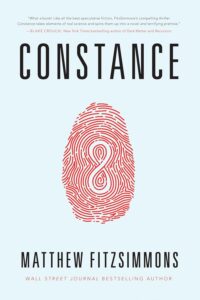What do the books Infinite, Interference, Bandwidth, and Constance have in common?
Give up? It’s not obvious.
They’re all books that I discovered through Amazon’s First Reads program. If you’re an Amazon Prime member and like to read, I highly recommend this program. It’s a great way to find new authors and build out your reading list, which is why I like it so much. It also doesn’t hurt that I’ve discovered my share of great books (and authors) through it.
Oh, and the other thing these books have in common is that they’re all science fiction books based on hard science fiction. In the case of Constance by Matthew Fitzsimmons, the plot of the story is built around cloning, specifically mind uploading and replication into another human body.
In the near future, a procedure is invented that allows people to upload their minds at routine intervals. It is an expensive procedure that only the wealthy and select individuals enjoy. Should death befall an ‘uploaded’ individual, their most recent uploaded is downloaded into a new body. These individuals are effectively immortal.
The story gets going when Constance wakes up after finishing one of her routine mind uploads. The awakening is unlike any other she’s experienced. There’s lots of confusion, strange faces. Apparently, they are trying to detain her, but one of the nurses helps her to escape. She soon discovers that she’s a clone of her former self without any knowledge of what’s happened since her last upload. From there, she attempts to reconstruct the events of her previous life so she can understand how she died, including who was responsible for her death.
Constance is a sci-fi thriller that will keep you engaged. Fitzsimmons keeps the story moving and catches you with some well place plot twists. It was hard to put down at times. However, even more compelling were the points Fitzsimmons brings up regarding the ethics and morality of cloning, making points both for and against it. The considerations are set against the backdrop of one’s struggle with their humanity when they are brought back to life as a clone, including how they deal with the ramifications of being a different person in the same body, how it affects their mental state, and how governments and society might deal with accepting clones.
I wouldn’t consider Constance a Must Read, but it is a Fun Read that keeps your attention, engages your imagination, and turns into an entertaining thriller that is a real page turner. And if you’re of the opinion that science fiction has a way of predicting the future, then it’s not a matter of ‘if’ but ‘when’ human cloning will occur. The more books I read about it, and it feels like it’s been quite a few lately, the more I begin to feel it’s likely, even if it seems far-fetched today. As brought up in Constance, and given how long it can take for the government and laws to catch up to technology, it would be best that the ethical, legal, as well as humanitarian issues around cloning are addressed sooner rather than later.

